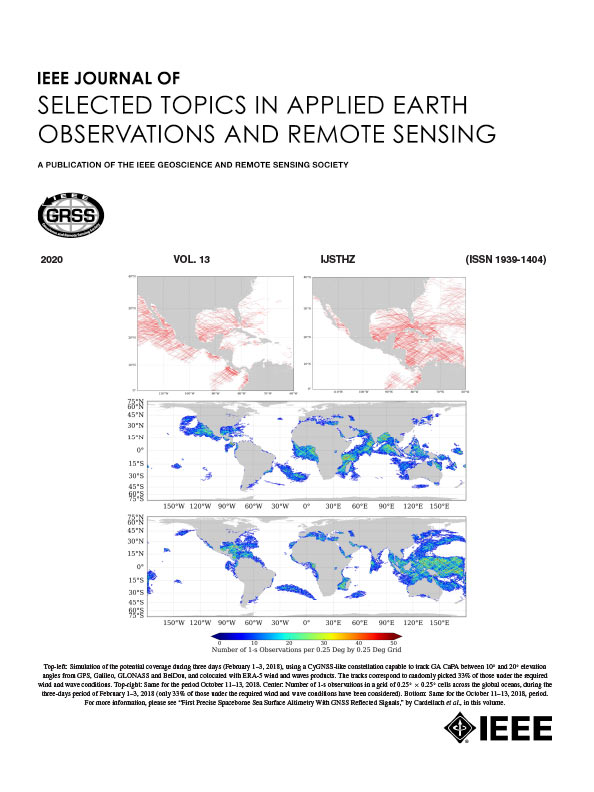ICL-Net: Inverse Cognitive Learning Network for Remote Sensing Image Dehazing
IF 4.7
2区 地球科学
Q1 ENGINEERING, ELECTRICAL & ELECTRONIC
IEEE Journal of Selected Topics in Applied Earth Observations and Remote Sensing
Pub Date : 2024-09-04
DOI:10.1109/JSTARS.2024.3454754
引用次数: 0
Abstract
When imaging the Earth's surface, space-based optical imaging sensors are inevitably interfered by scattering media, such as clouds and haze, resulting in serious degradation of remote sensing images they capture. To enhance the quality of remote sensing images and mitigate the influence of clouds, haze, and other media, we construct a novel approach called the inverse cognitive learning network. The network mainly consists of multiscale inverse cognitive learning blocks that we designed. It has the capability to extract image features at multiple scales, adaptively focus on the global information and location-related local information, and effectively constrain the haze. In the multiscale inverse cognitive learning block, we embed the designed inverse cognitive learning module and parallel haze constraint module. The inverse cognitive learning module simulates the inverse process of human brain cognitive image, and gradually learns the haze information from the depth, moderate, and breadth channel features. The parallel haze constraint module integrates the extracted haze information through a dual-branch approach to realize strong constraints on haze features. Experimental results indicate that our approach notably enhances the clarity of remote sensing images that suffer from cloud cover and haze, and possesses more perfect haze removal effect and robustness than state-of-the-art dehazing approaches.ICL-Net:用于遥感图像去毛刺的逆认知学习网络
天基光学成像传感器在对地球表面成像时,不可避免地会受到云和雾霾等散射介质的干扰,导致所拍摄的遥感图像质量严重下降。为了提高遥感图像的质量,减轻云、雾霾等介质的影响,我们构建了一种名为逆认知学习网络的新方法。该网络主要由我们设计的多尺度逆认知学习模块组成。它能够提取多种尺度的图像特征,自适应地关注全局信息和与位置相关的局部信息,并有效地约束雾霾。在多尺度逆认知学习模块中,我们嵌入了所设计的逆认知学习模块和并行雾度约束模块。逆认知学习模块模拟人脑认知图像的逆过程,从深度、适度和广度通道特征中逐步学习雾度信息。并行雾度约束模块通过双分支方法整合提取的雾度信息,实现对雾度特征的强约束。实验结果表明,我们的方法显著提高了受云层和雾霾影响的遥感图像的清晰度,与最先进的去雾霾方法相比,具有更完美的去雾霾效果和鲁棒性。
本文章由计算机程序翻译,如有差异,请以英文原文为准。
求助全文
约1分钟内获得全文
求助全文
来源期刊
CiteScore
9.30
自引率
10.90%
发文量
563
审稿时长
4.7 months
期刊介绍:
The IEEE Journal of Selected Topics in Applied Earth Observations and Remote Sensing addresses the growing field of applications in Earth observations and remote sensing, and also provides a venue for the rapidly expanding special issues that are being sponsored by the IEEE Geosciences and Remote Sensing Society. The journal draws upon the experience of the highly successful “IEEE Transactions on Geoscience and Remote Sensing” and provide a complementary medium for the wide range of topics in applied earth observations. The ‘Applications’ areas encompasses the societal benefit areas of the Global Earth Observations Systems of Systems (GEOSS) program. Through deliberations over two years, ministers from 50 countries agreed to identify nine areas where Earth observation could positively impact the quality of life and health of their respective countries. Some of these are areas not traditionally addressed in the IEEE context. These include biodiversity, health and climate. Yet it is the skill sets of IEEE members, in areas such as observations, communications, computers, signal processing, standards and ocean engineering, that form the technical underpinnings of GEOSS. Thus, the Journal attracts a broad range of interests that serves both present members in new ways and expands the IEEE visibility into new areas.

 求助内容:
求助内容: 应助结果提醒方式:
应助结果提醒方式:


